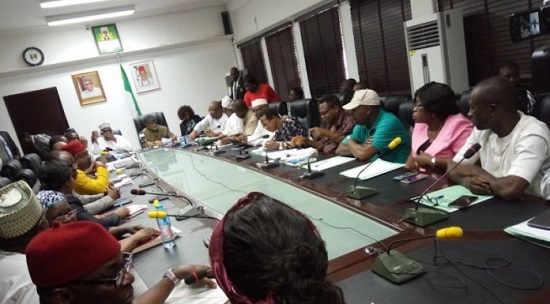•FG meets labour on petrol, electricity tariff hike today
Amidst concerns over the long closure of public universities, the leadership of the Academic Staff Union of Universities ((ASUU) has requested that it be given till Wednesday to conclude consultations with its chapters on the terms of resolution of the dispute with the federal government.
Similarly, the federal government team is expected to continue discussions with the organised labour unions on ways of resolving the dispute over the recent increases in the pump price of petrol and electricity tariff.
ASUU was expected to revert to the federal government latest last Friday on whether or not it has accepted the proposals to end the nine-month-old industrial action by its members.
But THISDAY investigations revealed that ASUU has asked for an extension of time to Wednesday as it could not collate all the branches’ decisions by last Friday.
A source told THISDAY at the weekend that the union had requested that the meeting scheduled for last Friday with the federal government negotiating team be further shifted to Wednesday to enable it to collate and analyse positions of its branches nationwide.
“ASUU requested for the extension of time for it to hold wider consultations with members and to be able to receive positions of the various branches. They said they should be given till Wednesday to conclude their parley with members,” the source said.
At the last meeting with ASUU in November, the federal government had offered to pay the lecturers not registered with the Integrated Payroll and Personnel Information System (IPPIS) salary arrears from April to June using the old payment method as a measure of goodwill, pending the approval of the ASUU-initiated platform, the University Transparency and Accountability Solution (UTAS).
Minister of Labour and Employment, Senator Chris Ngige, while reporting on the offers made by the government to ASUU, said the government had earlier brought an aggregate offer of N50 billion to ASUU, N20 billion for revitalisation and N30 billion for earned allowances.
Ngige said in order to show good faith that the government is still with the lecturers on the issue of funding, a new proposal was made to increase the revitalisation fund from N20 billion to N25 billion and for the earned allowances to be raised to N40 billion immediate payment, making a total of N65 billion for revitalisation.
However, THISDAY learnt that ASUU rejected the amount at their last meeting with the government side.
The union demanded N110 billion, which is 50 per cent of a tranche of N220 billion it had earlier demanded but the federal government rejected, citing fund paucity.
The disagreement resulted in another offer by the federal government team to raise the revitalisation fund to N40 billion while the earned allowances for unions remain N30 billion.
The federal government also gave assurances that it would address the pending issues of constituting visitation panels for federal universities and raising a new renegotiation team to begin talks with ASUU on the 2009 agreement.
It was based on the new proposal by the federal government that ASUU agreed to go back to brief its organs and to revert to the government last Friday on whether or not it has accepted the terms to call off the strike.
But preliminary reports from the congresses held by ASUU branches last week to ratify the agreement showed a divergence of opinions.
While some accepted the government’s offer, most of them were said to be demanding full payment of their salary arrears up to November before suspending the strike.
Meanwhile, the meeting of the organised labour and the federal government on the hike in fuel price and electricity tariff is scheduled to hold today.
The meeting is meant to enable the government to present to labour details of progress made in fulfilling promises on palliatives aimed at cushioning the socio-economic impact of increases in the pump price of petrol and electricity tariff.
The leadership of the two labour unions, the Nigeria Labour Congress (NLC) and Trade Union Congress (TUC), had insisted on the reversal of the recent increase in the price of petrol, which they described as a violation of its understanding with the government.



